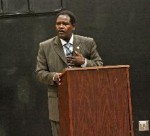A moral obligation for all

Mohamed Yahya was born in a small village in eastern Darfur and grew up in “a small house built of straw and wood, not like the buildings (people) have here.”
Yahya came from a family of farmers but was fortunate enough to attend a university in Cairo, Egypt.
Yahya, who spoke at USF as part of the University Lecture Series Thursday evening, now works as an activist to educate the public about the genocide and humanitarian crisis in Darfur, which has driven over 500,000 people from their homes and has since spilled over into neighboring countries.
The violence stems from a conflict between the government-backed Arab, Janjaweed militia and the tribal Massaleit community, which is comprised of non-Arab Muslims. According to the Save Darfur campaign, 400,000 people have died, and dissent on the United Nations Security council has stalled decisive action.
In 1993, only weeks after Yahya took a break from school to visit his family, his village was decimated by the Janjaweed militia. Those in his family who were fortunate enough to escape fled to Chad with tens of thousands of other displaced Darfurians. Among the 21 members of his family slaughtered by the militia were two of his grandparents. His grandparents were burned alive after being thrown inside their own hut; because they were disabled, they could not flee.
Yahya received word from his mother a week after the invasion of his village. She had escaped along with two of his siblings. In a letter to Yahya, she told him: “As long as you are alive, we will meet again.”
The letter that Yahya received in 1993 was the last communication he received from her for a long time.
“Thank God, we were able to find my mother, we were able to find my brother. But that is not the issue. The issue is those who are still in Darfur. We need to save them as soon as possible,” he told an audience of about 200 people.
With a strong desire to do something about not only his own family members but also the countless other villages that were destroyed in the initial attacks, Yahya and his colleagues at Al-Azhar University banded together with three goals in mind: to end the genocide, to collect monies to send to anti-genocide programs and to educate the world community about the crisis in Darfur. For more than a decade, these same goals have guided the actions of Yahya and many of his fellow countrymen.
In 1995, Yahya and others formed the Representatives of the Massaleit Community in Exile (RMCE) and began pressuring the international community to pay heed to the atrocities in Darfur. Yahya says, “What is happening in Darfur is worse than genocide. If we could create a word for Darfur, we would,” Yahya said.
Words and communication are key to Yahya’s work of educating the public about Darfur.
Yahya speaks three languages: Arabic, his tribal tongue and English. He said he learned English because the only responses he had to his letters were from America and Europe.
Because of several attempts on his life, Yahya sought and was granted political asylum in the United States in 2002.
Yahya told the stunned crowd about the brutality in Darfur.
“Imagine when the killers are guarding the victims in the camps,” he said.
The Janjaweed militia has been set up by the government to patrol refugee camps, and every day “they rape them inside their camps and they kill them inside their camps.” In a place that is supposed to be a safe haven, the relentless Sudanese government commits crimes against humanity while the international community looks on and does nothing, he said.
Yahya begged the crowd to tell him who should help and what they would do. As a human, Yahya expressed his sentiment that “we have as human beings, regardless of religion, regardless of race, a moral obligation to band together.”
In the past four years, the United Nations has passed more than 17 resolutions about the situation in Darfur. The action has done little to stop or slow the genocide. The UN has not sent humanitarian aid to the region, nor has the organization sent neutral peacekeepers to attempt to restore order.
Yahya was quick to mention that China, which is a permanent member of the UN Security Council and has veto power, gets nearly 67 percent of its oil from Sudan.
“Human rights issues are not their priority; their priority is how to get something out of it,” he said.
He ended the night with a question-and-answer session in which he told those who want to take action in Darfur that there is a means for them to do so.
Yahya suggested teaching in a refugee camp over summer break and putting political and economic pressure, not only on Sudan, but on their supporters as well. Yahya even called for a boycott of the Olympics in Beijing, which elicited the cheers of about 30 students.
Yahya’s message to the United States was very clear: “Use your efforts to rescue those in Darfur.”






